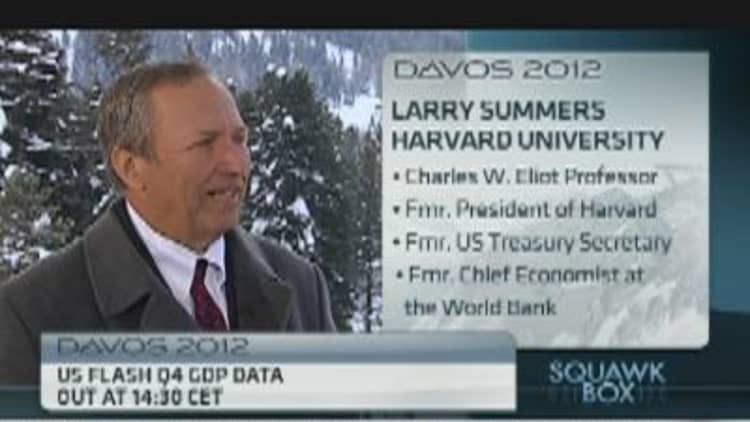There is still a long, hard struggle ahead to fix the U.S. and Europe’s economies, Larry Summers, the Harvard University professor and former Treasury Secretary, told CNBC at the World Economic Forum in Davos Friday.
“We have all got a lot of work to do,” Summers, who played a key role in the early years of President Barack Obama’s administration, said.
He believes that European governments should be “redoubling” their efforts to solve the crisis.
The euro zone debt crisis has been top of the agenda in Davos this week. German Chancellor Angela Merkel opened the conference with a downbeat speech emphasizing the need to solve the problems in the euro zone.
The European Central Bank injected more liquidity into the European markets through a long term refinancing operation (LTRO) in December, which Summers described as “a very important step.”
“That’s lubricating credit and economic activity. The sense that we are near the edge of a precipice has been clawed back,” Summers said.

“The question is whether this is grounds for complacency or will the time provided by the LTRO be used to make the fundamental adjustments necessary.”
“The better approach to financial stability goes through raising capital requirements, reducing leverage, ensuring liquidity, pushing for recognition of the problems, making sure that regulated sector doesn’t face untenable competition from an unregulated banking sector,” he added.
Germany, the euro zone’s largest economy, which has performed relatively well during the crisis because of its high saving levels and strong exports, will be key to the euro zone’s survival.
“There’s no question that what happens in Germany is going to be central. Germany has based its economic success on a substantial surplus. Germany is going to have to adjust its economic model. We need to recognize that it’s not possible for some countries to reduce deficits without others reducing their surpluses,” Summers said.
“The political posturing in Europe is going to have to be more orientated towards expansion. There’s room for German wages and spending to rise.”
The importance of growth to solving the crisis has been high on the agenda at Davos, as the specter of recession looms in Europe.
“If everyone in an economy decides to save more and spend less, one person spending less affects another’s income so the result is less spending for others and contraction – less saving, more debt and a negative outcome,” Summers said.
Summers believes that the U.S. economy is on the right path to solving its problems.
The Washington Post reported earlier this week that predictions which he passed to President Obama in 2008 about the economy were very optimistic.






